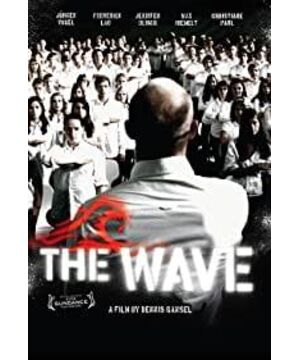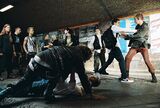and use the most national tears to forgive a tragedy
- The Waist Band "Nation"
is one of the five films competing for the Oscar for Best Foreign Language Film in 2009, based on real events in the United States in 1967 The meaning of the adapted German film for the Chinese lies in its own reflection.
First of all, we can be sure that such a story has indeed happened, and it has also happened in China, is happening, and will happen in the future.
"Today's people want to rebel, but they can't find the direction to rebel; the so-called values don't exist anymore, right? Everyone thinks about themselves... What our generation lacks is someone who can unite us This is the zeitgeist. But you look at today’s society, who is the most searched on Google? Paris Hilton.” Even if this is a specific line that foreshadows the “wave” movement that follows, but , we still easily believe, even believe, that this is the truth, it is not sensational. Later, during the "National System" activity week, the "dictatorship" experiment of Mr. Wengel and the students' "wave" movement: uniform clothes, gestures, clear LOGO, Tim who had the courage to confront the evil forces, and finally bought it back from the Internet. The two bullets in the pistol, one towards the "partner" and the other towards his head, are not sensational. Because similar incidents abound in China, and in comparison, China's socialist system and "dictatorship" are equally outrageous, but they have no charm at all.
The Weng'an Incident in Guizhou, the Longnan Incident in Gansu, the Menglian Incident in Yunnan... A "weiguangzheng" party can explain the origin of the incident in a single sentence: "A few people with ulterior motives incite interests, and underworld forces are directly involved. An emergency that openly provokes our party committee and government." When faced with the SARS and poisoned milk powder incidents, they adopted a more effective attitude: "First conceal it, if you can't deceive it, admit part of it if you can't deceive it, and then withdraw a few officials. In the end, the promotion and packaging became a credit.” (Lian Yue)
"Not everything can happen at any time." (Heinrich Wolfen) At any time, everything must have its two sides. They say, forget, there is a problem with the system; they say, forget the system, there is a problem.
Facts have confirmed everything. Individual acceptance or not acceptance is ineffective. What the people exchange with tears and blood is the rapid paralysis of nationalism and idealism. Rational indignation turns into confusion, then indifference and numbness, and finally become accustomed to it. The event lost its duality in the fall of the basic doctrine, the ability to discriminate.
where is the problem? Why "The Nazis Are Quick, Just Five Days"? A great country, dubbed "reform and opening up", has made great strides forward, outward, toward the world, and into space. In the past 30 years, why has it established laws and regulations, established opinions, and established national confidence?
"You must wear a red scarf; you must perform morning exercises, raise the national flag, and play the national anthem; you must stand up in unison to say goodbye to the teacher after class; you must respect the teacher, and you must keep yourselves safe..." The system education cultivated a group of moral fallout The cynicism of the people; the college entrance examination system, which is more difficult to explain every year, has evolved into a torture of human nature: from simple and naive to complex and calculating, from wit and agility to mechanical and rigid, so we escape, so we fear, So we committed suicide... So the living people suddenly realized that we were going to become "anarchists", and after "anarchism", people fell into a spiral of confusion: confusion, emptiness, boredom and even a little perverted .
The "dictatorship" experiment in "The Tide" still shows its positive side despite its tragic ending. On the one hand, it is a mockery of its opposite "anarchism", which has long existed in name only. On the other hand, it is the experiment itself. "Wave means collective to me, you know, you have a happy family, and I don't" rationalist Marco; or "Why go home, no one cares about me there" fanatic Tim, And those thoughts about the "wave" read out by Mr. Wengel in the auditorium: "interesting", "let us all be equal", "birth, belief, family no longer matter", "regaining the meaning of life"... …The emergence of the "wave" has allowed people who feel inferior due to lack of family warmth and loss of individual value to enjoy a sense of collective belonging and security, allowed idlers and troublemakers to correct their style, made cowardly people brave, and made pessimistic world-weary people rekindle their lives hope and confidence...
All of these are the unique magic power of "dictatorship", but when the "wave" develops to a certain extent, the formation of individual differences leads to a situation that is difficult to control, which no one expected, including the text Mr. Gehr himself, he firmly believes, "the Nazis cannot be reproduced in Germany, because there is no popular base." Although the real events did not develop to the tragic end of the movie, there was an interview with Ron Jones, the prototype of Wenger's teacher. However, the last shot of "The Wave" is still reserved for Mr. Wengel. The close-up of the face, between light and shadow, is mixed between light and dark. It is a confusion of the advantages and disadvantages of his "dictatorship" experiment, and he also has doubts about the current social situation. This may be the true stance of Dennis Gansel, the director of Hitler's Boys: "...go to your local school, can you find democracy there?"
View more about The Wave reviews











